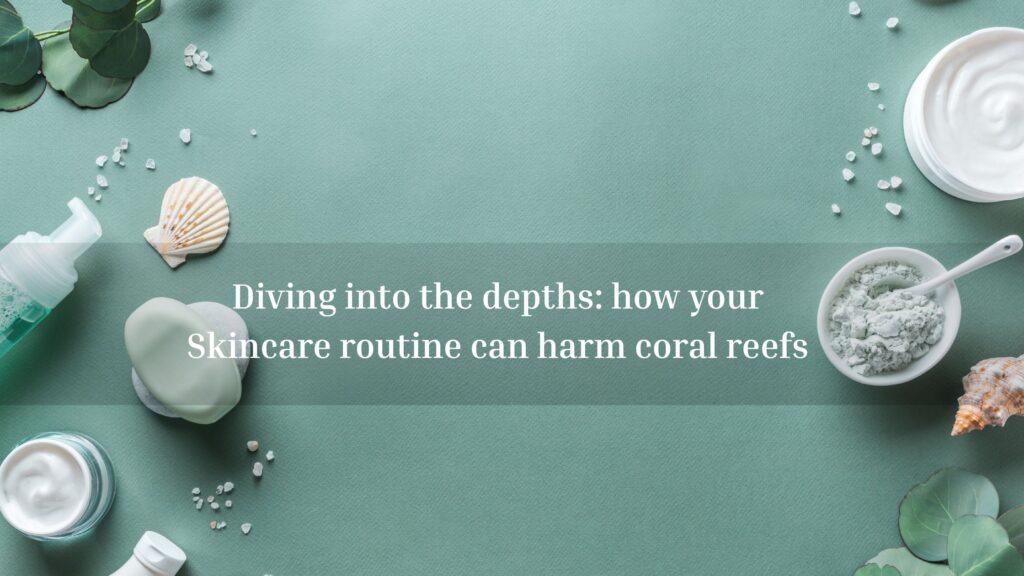Uncategorized
Diving into the depths: how your skincare routine can harm coral reefs
The significance of coral reefs extends far beyond their mesmerizing beauty. They are home to an astonishing variety of marine life, including fish, crustaceans, mollusks, and countless other species. The intricate structures of coral reefs also provide protection and nurseries for many marine organisms, contributing to the overall biodiversity of our oceans.
The enchanting beauty of coral reefs has captivated explorers and ocean enthusiasts for centuries. These vibrant underwater ecosystems support a diverse array of marine life and play a crucial role in maintaining the health of our oceans. However, in pursuing beauty and self-care, we often overlook the potential harm our skincare routines can inflict upon these delicate ecosystems.
The Threat of Chemical Sunscreens:
Sunscreen is essential to many skincare routines, particularly outdoors or in sunny destinations. However, certain chemical sunscreen ingredients, such as oxybenzone and octinoxate, pose a significant threat to coral reefs. Research has shown that these chemicals can cause coral bleaching, disrupt coral reproduction, and even lead to the death of coral polyps. When we swim in the ocean or wash off sunscreen in the shower, these chemicals enter the marine environment, where they accumulate and cause long-term damage. Around 6,000 to 14,000 tons of sunscreen lotion are estimated to find their way into coral reefs annually. Choosing coral reef sunscreen alternatives is critical to minimize this threat and support coral protection efforts.
Microbeads: Tiny Particles, Massive Consequences
Microbeads, those tiny plastic particles found in some exfoliating cleansers and scrubs, may seem harmless at first glance. However, these minuscule beads can have disastrous effects. As they get washed down the drain and enter our waterways, they are often too small to be filtered out by wastewater treatment plants. Eventually, they find their way into the ocean, where marine organisms, including coral polyps, can ingest them. This ingestion can lead to internal damage, hinder their growth, and even cause death. Additionally, microplastics, including microbeads from skincare products, are a significant concern. It is estimated that as much as 5 trillion pieces of microplastics are floating in the world’s oceans, posing a severe threat to marine life, including coral reefs.
Harmful Chemicals in Skincare Products:
Aside from sunscreen and microbeads, other chemicals in skincare products can harm coral reefs. Ingredients such as parabens, phthalates, and triclosan have been shown to have toxic effects on marine life, including coral. These substances can disrupt hormonal systems, impair coral development, and contribute to coral reef degradation. It is essential to read ingredient labels carefully and choose Eco-friendly skincare products that do not contain these harmful chemicals.
The Importance of Reef-Safe Alternatives:
As awareness about the impact of skincare products on coral reefs grows, more companies are developing reef-safe alternatives. These products are specifically formulated to minimize environmental harm without compromising their effectiveness. Look for mineral-based sunscreens containing zinc oxide or titanium dioxide, which provide a physical barrier against harmful UV rays. Opt for natural exfoliants like ground apricot kernels or sugar instead of microbeads. Choosing Eco-friendly skincare products can make a significant difference in preserving the health of coral reefs and supporting coral protection efforts.
Individual Actions, Collective Impact:
While it is easy to underestimate the influence of our skincare routines on coral reefs, the collective impact is substantial. By making conscious choices and opting for sustainable skincare routine practices and Eco-friendly skincare products, we can contribute to preserving these fragile ecosystems. Additionally, spreading awareness among friends, family, and online communities about the importance of reef-friendly skincare can create a ripple effect that encourages others to make sustainable choices.
As we navigate the vast expanse of the skincare industry, we must remember our responsibility as stewards of the environment. Our daily routine choices can have far-reaching consequences, even reaching the depths of coral reefs. By educating ourselves about the potential harm caused by certain skincare ingredients and opting for reef-safe, Eco-friendly skincare products, we can take active steps to protect coral reefs and ensure their existence for future generations.
Measurements taken around coral reefs in Hawaii found levels of one such marine-toxic chemical, oxybenzone, at concentrations 12 times higher than the level at which it impacts juvenile coral.
Coral reefs are already at risk due to warming waters and pollutants. This year, an Australian government agency study has found that around 91% of reefs along the Great Barrier Reef have coral bleaching. This is the sixth mass bleaching event of the reef on record and the fourth since 2016. What is alarming is that almost every coral reef that was surveyed across the 2,300-kilometre system had been bleached.
The United Nations Environment Programme (UNEP) says 25–50% of coral reefs are destroyed, and 60% are already under threat. The Global Coral Reef Monitoring Network (GCRMN) reports that coral reefs worldwide have already experienced a 50% decline in living coral cover over the past few decades. So it’s high time for us to make informed decisions. Natural products are always safer for you and the ecosystem when choosing personal care products. Small actions like using coral reef sunscreen, building a sustainable skincare routine, and educating others can go a long way in our mission to save coral reef systems.
Reference:

